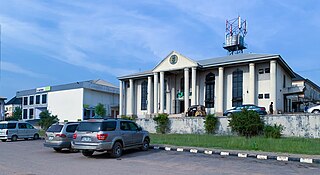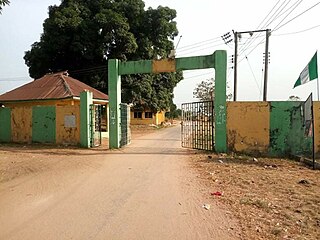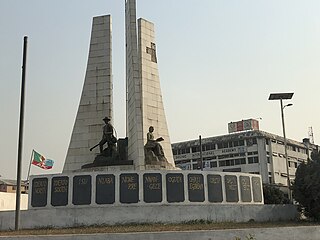
Onitsha is a city on the eastern bank of the Niger River, in Anambra State, Nigeria. Onitsha along with various cities and towns in southern Anambra State, northern Imo State and neighboring Delta State on the western bank of the Niger River, form a continuous metropolitan area.

Anambra State is a Nigerian state located in the South-eastern region of the country. The state was created on 27 August 1991. Anambra state is bounded by Delta State to the west, Imo State and Rivers State to the south, Enugu State to the east and Kogi State to the north. The state's capital is Awka, while the state’s largest city is Onitsha which is regarded as one of the largest metropolis in Africa. Nnewi is the second largest commercial and industrial city in Anambra State, and also a known automobile hub within Nigeria and Africa.

Owerri is the capital city of Imo State in Nigeria, set in the heart of Igboland. It is also the state's largest city, followed by Orlu, Okigwe and Ohaji/Egbema. Owerri consists of three Local Government Areas including Owerri Municipal, Owerri North and Owerri West, it has an estimated population of 1,401,873 as of 2016 and is approximately 100 square kilometres (40 sq mi) in area. Owerri is bordered by the Otamiri River to the east and the Nworie River to the south. The Owerri Slogan is Heartland. It is also called the Las Vegas of Africa, due to the night life of the city and the numerous hotels, casino and leisure parks all over the city.

Benue State is one of the North Central states in Nigeria with a population of about 4,253,641 in the 2006 census. The state was created in 1976 and was among the seven states created at that time. The state derives its name from the Benue River initially called Ber-nor, a compound word in Tiv language which means river or lake of hippopotamus the name Ber-nor was corrupted to BENUE by colonial masters, the river is the second largest river in Nigeria after the River Niger. The state borders Nasarawa State to the North; Taraba State to the East; Kogi State to the West; Enugu State to the South-West; Ebonyi and Cross-Rivers State to the South; and has an international border with Cameroon to the South-East. It is inhabited predominantly by the Tiv, Idoma and Igede people. Minority ethnic groups in Benue are Etulo, Igbo and Jukun people etc. Its capital is Makurdi. Benue is a rich agricultural region; common crops cultivated in the state include oranges, yams, mangoes, sweet potatoes, cassava, soya bean, guinea corn, flax, sesame, rice, groundnuts and palm trees.

Enugu State is a state in the South-East geopolitical zone of Nigeria, bordered to the north by the states of Benue and Kogi, Ebonyi State to the east and southeast, Abia State to the south, and Anambra State to the west. The state takes its name from its capital and largest city, Enugu. The city acquired township status in 1917 and was called Enugwu-Ngwo. Due to the rapid expansion towards areas owned by other indigenous communities, it was renamed Enugu in 1928.

Awka is the capital city of Anambra State, Nigeria. The city was declared capital on 21 August 1991, after the creation of Anambra and Enugu state, which moved the capital from Enugu to Awka. The city has an estimated population of 301,657 as of the 2006 Nigerian census. The both LGAs of Awka South and North had a estimated population of 430,200 in 2022. The city is located at 199.1 kilometres (123.7 mi), by road, directly north of Port Harcourt in the centre of the densely-populated Igbo heartland in South-East Nigeria.

Orlu is the second-largest city in South East, Imo State, Nigeria, with a population of 420,600. It has a long history as the headquarters for the Organisation of African Unity (OAU) and humanitarian relief agencies during the Nigeria-Biafra Civil War. The city houses the Nigerian headquarters of the British Cheshire Home. It is the second most developed city after Owerri in Imo state.

Oguta is a town on the east bank of Oguta Lake in Imo State of southeastern Nigeria.
Sam Mbakwe International Cargo Airport, also known as Imo State Airport, serves Owerri, the capital city of Imo State in southeastern Nigeria. It is located in Ngor Okpala Local Government Area, Imo State.
Orodo is an Igbo community in Mbaitoli local government area of Imo State, Nigeria. It is situated between Owerri city and Orlu town. Orodo has borders with Ogwa, Mbieri, Afara, Ifakala, Umuaka, Amurie Omanze and Amandugba. Also, the current Mbaitoli Local Government Headquarters is significantly located at a part of Orodo called Ofekata. The community said to have seven road junction, in the center of the community called nkwo-orodo. The roads are: Ubaha-Eze road, Ahaba road, Amaukwu road, Umuonyahu road, Amaku road, Ofekata road and Eziama road.

Imo State is a state in the South-East geopolitical zone of Nigeria, bordered to the north by Anambra State, Rivers State to the west and south, and Abia State to the east. It takes its name from the Imo River which flows along the state's eastern border. The state capital is Owerri and the State's slogan is the "Eastern Heartland."

Onuimo is a Local Government Area of Imo State, Nigeria. Its headquarters are in the town of Okwe. It comprises four towns namely: Okwe, Okwelle, Umuduru-Egbeaguru and Umuna. It is home to very prominent Nigerians such as The ever influential dynamic estate surveyor; Prof. James Gaius Ibe- USA trained and tenured professor of economics, finance and business administration, Dr Dennis Ndububa-a graduate of UNN with close to 40 years of professional practice as a medical doctor; Dr. Victor Ndububa; Dr. Christian Egemba; Dr. Kaunda Ibe-Consultant Neurosurgeon at Imo State University Teaching Hospital Orlu Imo State; Dr. Geraldine Echue-winner in Global Chemistry competition; Chief Adol N. Obi - the former bursar of Federal Polytechnic Nekede Owerri, and Engr Ekene Echefu - a lecturer in Mechatronics engineering department, federal polytechnic Nekede Owerri.Taiwo Damilola also served there. Also American author and writer Dreux Richard resides in Okwe to complete his writing when in Nigeria.

Oru-East is a Local Government Area of Imo State, Nigeria. Its headquarters is at Omuma. The following are towns that make up Oru East: Akatta, Akuma, Amagu, Amiri, Awo-Omamma, and Omuma.
The Isu people are the largest group of the Igbo people of Nigeria. Isuama, in which the purest Igbo is said to be spoken, is to be found the heart of the Igbo nationality; consequently it is quite reasonable to look among its people for the original fountain-head from which all the other clans have sprung. This inference too is supported not only by the purity of the language, but by this right of dispensing or rather of confer-ring royalty which is undoubtedly the prerogative of the Nri or N'shi people. In the pre-colonial era, the Igbo people were protected from external invasion by the dense forests of the region, which also had the effect of encouraging diversity. Thus as warriors the neighboring Oratta (Uratta) people looked down on the Isu people, who were traders.
Okwudor is a town in Njaba Local Government Area of Imo State, Nigeria. It is one of the local government areas that make up the Orlu zone of Imo state. Okwudor shares boundaries with, Orlu, Awo-omamma and Umuaka towns. Situated on the bank of Njaba River, the famous river separates Okwudor from Umuaka.
The South East is the one of the six geopolitical zones of Nigeria representing both a geographic and political region of the country's inland southeast. It comprises five states – Abia, Anambra, Ebonyi, Enugu, and Imo.
Okwuabala is a semi-urban community in Orlu Local Government Area of Imo State, in the Niger Delta region of South Eastern Nigeria. The community shares boundaries with Ogberuru, Mgbe and Amaifeke. The indigenous people of Okwuabala belong to the Igbo ethnic group and the town is situated within the Igbo cultural area. The main language spoken in Okwuabala is the Orsu-Orlu variant of the Igbo language.
Akatta is a major town in Oru East Local Government Area of Imo State in Nigeria. It is bordered to the north west by the towns Nnempi, Akuma and Amagu, to the north east by Amaebu and Amazu, to the south east by Okporo, Umutanze and Atta Njaba, and to the south west by Omuma. The following villages make up Akatta: Akwa, Urah, Ichi-Amaka, Ubaha, Ubahangwu, Okporo, Okwu and Azu Akatta. The town is approximately 10 km (6 mi) west of Orlu.

The insurgency in Southeastern Nigeria is a military conflict that broke out in the city of Orlu, Imo State, Nigeria on 16 January 2021, when the Nigerian Army moved to crush the paramilitary wing of the Indigenous People of Biafra (IPOB), the Eastern Security Network (ESN). The conflict escalated after the ESN managed to repulse the initial push by the Nigerian Army, but IPOB ended the initial crisis by unilaterally withdrawing the ESN from Orlu. After a few weeks of quiet, Nigeria launched a military offensive in the area to destroy the ESN. On 19 February 2021, IPOB declared that as of the day before, a state of war existed between Nigeria and Biafra. Three weeks later, another separatist group declared the formation of a Biafran interim government which was subsequently endorsed by IPOB. Since then, the Biafran separatists have begun to form alliances with other separatist groups in Nigeria and Cameroon. Despite these developments, the separatists claimed that their militant operations were mainly aimed at defending local communities from armed herders and bandits instead of fighting the Nigerian government. In late June, IPOB leader Nnamdi Kanu was arrested by Interpol and handed over to Nigerian authorities.

The Eastern Security Network (ESN) is the paramilitary organization of the Indigenous People of Biafra (IPOB), a pro-Biafra separatist movement.












